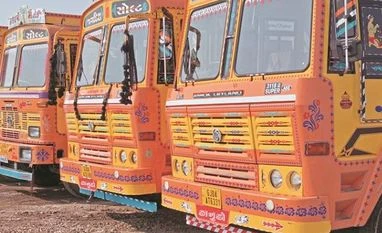The sharp dip in car sales is not news to R S Bhasin, managing director, Janta Roadways, who has had 130 out of his 200 trucks in Chennai lying idle owing to the severe contraction in the passenger vehicle market. His company draws the bulk of its business from transporting cars to dealerships.
Passenger vehicle sales in India dropped 20.5 per cent in May, the steepest fall since 2001. Sales have been in a negative terrain for almost a year now. Bhasin doesn’t see any immediate respite from the slowdown that has sapped demand across consumer durables, packaged goods, and the automobile sectors.
Bhasin is among the thousands of transporters who are reeling under the impact of a slowdown that has gripped the world’s fastest growing economy. The fact that he plans to sell some of his trucks suggests that whatever hopes truck makers might have entertained of a revival in demand on pre-buying ahead of BS-VI emission norms may be wishful thinking.
Sales of medium and heavy-duty trucks, a proxy for an economy’s health, declined 19 per cent to 48,946 units in the first two months of the current fiscal over a year ago, according to the Society of Indian Automobile Manufacturers. The decline has been led by a drop in factory output.
A contraction in the output of natural gas, fertilisers, and crude oil pulled down the growth of India’s infrastructure sectors to 2.6 per cent in April. It had grown 4.9 per cent in March 2019 and 4.7 per cent in April last year.
“Buying a new vehicle is the last thing on our mind. We are struggling with what we have. The overall market is under tremendous pressure,” said Bhasin in response to whether he would bring forward the purchase of trucks to beat the price hike that is expected from April 1, 2020 with the implementation of BS-VI.
A low freight rate and a drop in cargo over the last seven months have hit truck operators hard. Freight rates on key trunk routes have dropped in the range of 11-15 per cent in the seven months since November 2018, according to the Indian Foundation of Transport Research & Training (IFTRT), a New Delhi-based think tank.
India switches to the strictest BS-VI norms from April 1, 2020. Truck makers are hoping that a strong pre-buying trend ahead of the switch-over may boost sales as transport companies advance their purchases to beat the price hike. The BS-VI trucks are expected to be dearer by at least 10-15 per cent as compared to the outgoing trucks with the older emission technology.
Vinod Aggarwal , MD and CEO, Volvo Eicher Commercial Vehicles, said that while demand is slow, he expects it to pick up in the months ahead and predicts a pre-buying trend to kick in over the December quarter.
Aggarwal estimates an incremental volume of 30-40 per cent for the industry in the months leading to 1 April. “On an average, prices are expected to go up by 10-15 per cent, so we do expect transporters to replace the existing fleet with new BSIV trucks to beat the hike,” said Aggarwal.
“The market should come back and pre-buy ahead of BSVI will be a major phenomenon,” said Girish Wagh, president, commercial vehicle business unit at Tata Motors recently. Wagh expects the truck market to grow in low single digits in FY20. Auto companies in India count dispatches to dealers as sales.
An official at Shriram Transport Finance Corp who declined to be identified said the trend of fleet owners selling off their trucks is also gaining traction because of the excess capacity that has been created since the axle norms took effect last November. The new norms allow existing trucks to carry an additional four to five tonnes.
“I don’t think the new truck sales are going to get any boost due to pre-buying as people anyways are straddled with excess capacity and there is a dearth of load - unless some concrete measures are taken to boost the overall economy. Confidence has taken a major hit all across,” he said.
Transport companies are treading with extreme caution. “It is very clear now that the entire demand cycle has collapsed. In this scenario why will anyone buy even if it is cheap?” said a top official at one of the largest transport and logistics firms who also declined to be identified. His firm had planned to buy 250 trucks and sell 450 till a few months back. “While selling has started, we are not buying. It is unlikely to happen till there is a complete revival, “ he added.
S P Singh senior fellow at IFTRT, also struck a cautious note. “Things have to change drastically in the next three months for pre-buying to happen.
Existing excess capacity has to be completely absorbed for the fleet operators to advance their purchases.”
Unlock 30+ premium stories daily hand-picked by our editors, across devices on browser and app.
Pick your 5 favourite companies, get a daily email with all news updates on them.
Full access to our intuitive epaper - clip, save, share articles from any device; newspaper archives from 2006.
Preferential invites to Business Standard events.
Curated newsletters on markets, personal finance, policy & politics, start-ups, technology, and more.
)